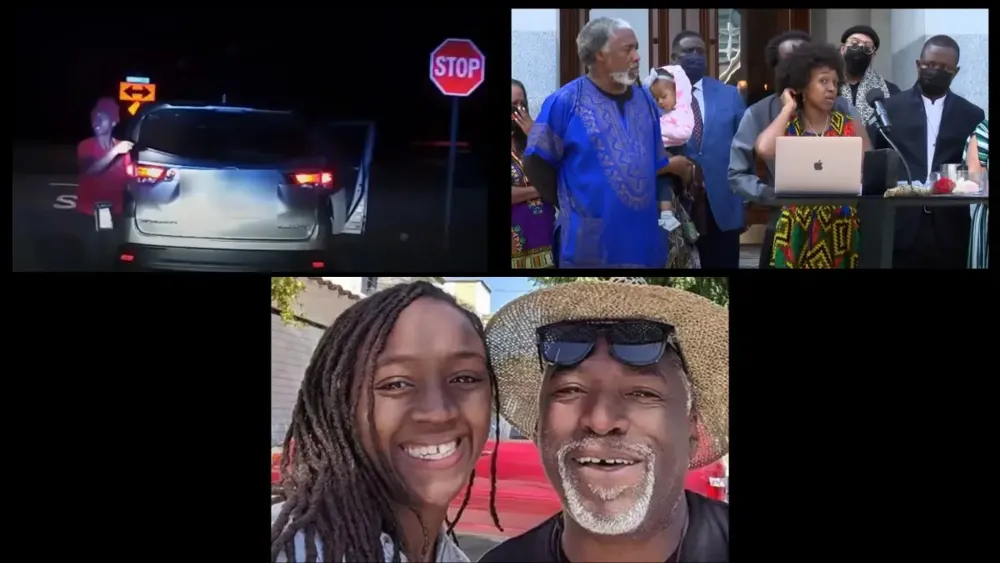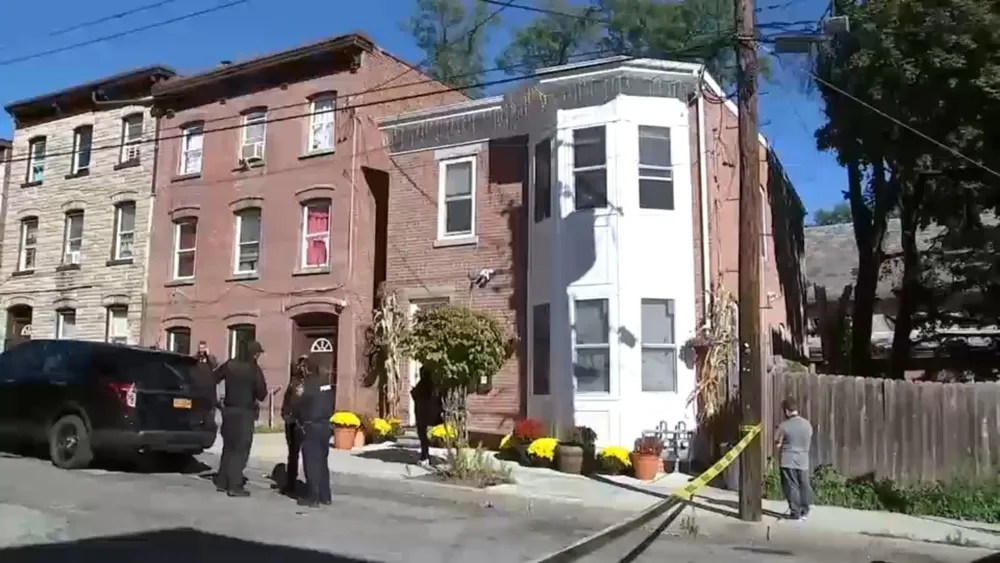‘Treated Us Less Than Human’: Black Woman Beaten Unconscious By California Deputies During Violent Traffic Stop Gets $17 Million Settlement

A Black woman who was allegedly dragged from her car, beaten and knocked unconscious by two Solano County, California, deputy sheriffs during a family road trip in 2020 will receive $17 million in a settlement with the county, her lawyer announced this week. Nakia Porter, then 33, her father, Joe Powell, then 61, her two young daughters and niece were driving home to Sacramento from Oakland on the evening of Aug. 6, 2020, when Porter decided to stop and let her father drive the rest of the way, according to her federal lawsuit obtained by Atlanta Black Star. She pulled off the highway and onto a dark, dead-end road in a rural area, and the two exited her Toyota Highlander to make the switch. As they did, the overhead lights of a parked sheriff’s patrol vehicle lit up, and a female officer, Deputy Lisa McDowell, approached. Nakia Porter and her father, Joe Powell (bottom), secured a $17 million settlement from Solano County in California in September 2025 after filing a federal lawsuit following their family's violent detention at gunpoint by deputy sheriffs during a traffic stop in 2020. (Photos: ABC10 and Solano County Sheriff's Office video via KTVU screenshots) The complaint says that Porter explained to McDowell what she and her father were doing, and that the deputy said, “OK. But get back in the car,” which Porter took to mean they should continue to switch seats. A male officer, Deputy Dalton McCampbell, then appeared, pointed his gun at Porter, and said, “This is a traffic stop. Get back in the car now.” ‘That’s for Free, Bro’: New Jersey Police Officers Mocked Black Man Recovering from Brain Surgery as They Squeezed His Scrotum and Beat Him During Arrest, Lawsuit Says Confused, Porter says she began to walk back to the driver’s side, when McCampbell unexpectedly yelled, “You know what, detain her!” and then the two deputies grabbed her arms and began to handcuff her, pinning her against her car. Porter says she did not make any threatening movements or attempt to flee, but only asked what was happening and pleaded for her rights. The lawsuit says police body camera video footage shows that she “relented” to being handcuffed, as her horrified father and frightened children looked on. https://www.youtube.com/watch?v9JbYReJwcZg “For those that are listening, I am not resisting,” Porter can be heard saying on police body camera footage. “You are not reading me my rights.” The deputies, who “appear to be white,” then dragged Porter away from her vehicle and, outside the view of the patrol car dashboard camera, “brutally beat the mild-mannered, 125-pound, female software engineer and dance teacher to the ground,” the lawsuit claimed. “They repeatedly punched, kicked, kneed, and struck her in the back of the neck, head, face, and stomach, as she struggled and prayed for her life.” During the beating, McCampbell allegedly forced Porter onto her stomach while McDowell grabbed Porter by her long braids and shoved her face into the concrete. McCampbell then threatened Porter with tasing while sitting on top of her. Porter says she lost consciousness for about five minutes, waking up inside the patrol car after the deputies had dragged her and tossed her into it. She felt pain all over her body, including her head and neck. Meanwhile, the deputies had ordered her father out of the car, made him walk backwards for 30 yards with his hands on the back of his head at gunpoint, then handcuffed him and placed him in the back of another sheriff’s vehicle. Throughout the encounter, McCampbell referred to Powell as “young man” even though he was the deputies’ elder and over 60 years old at the time, the complaint said, which to Powell “sounded like the racial slur ‘boy’ historically used to demean Black men.” His three young granddaughters (ages 3, 4 and 6) were left alone in the car in the dark, “scared without their caretakers and having witnessed their mother/aunt being arrested and beaten, and their grandfather also being taken from them” for at least 30 minutes, the lawsuit says. Other officers who arrived shone flashlights in the frightened children’s faces as they illegally searched the vehicle without probable cause, opening the glove compartment, rummaging through Porter’s purse, and looking at documents, “desperately looking for any pretext to justify their illegal conduct,” the complaint contends. In their depositions and pleadings, the deputies offered a differing account of the incident. They said they approached Porter’s vehicle after she did a U-turn in front of them, and they noticed that she had a Maryland license plate on the front of her car and a California license plate in the rear. Mismatching license plates is a violation of California law and can be a sign of a stolen vehicle, they argued. The deputies said Porter did not comply with their orders to get back in her car, and that she physically resisted McDowell when she tried to detain her. When McCampbell stepped in to assist, he said Porter “lunged forward and tried to break free” from them, slipped one hand out of the handcuffs, striking McCampbell in the head and neck, leaving a scratch on his neck. It was due to her resistance that McCampbell then “performed a hair pull takedown,” bringing Porter to the ground, he testified. Porter then swung at him and “flailed her arms,” and he punched her in the face and stomach “to gain control of her.” Concerned that “she may have lost consciousness,” McCampbell requested an ambulance for Porter, and the two deputies put her in the back of McDowell’s patrol car. When he came back to check on Porter, she was sitting upright in the backseat of the patrol car and “breathing normally,” he said. He asked for her driver’s license, and she consented for him to get it out of her purse, he claims. Porter explained that she had recently moved from Maryland to California and had forgotten to remove the front license plate. Using her ID, dispatch officers for the Solano County Sheriff’s Office soon confirmed that Porter was the owner of the Toyota Highlander, which was properly and currently registered in California, the complaint says. The deputies did not issue Porter a citation for the mismatched license plates, but decided to arrest her for allegedly disregarding their lawful orders and physically resisting and striking McCampbell (which Porter denies). After being examined by paramedics, Porter was taken to North Bay Medical Center, where she was not properly examined for a concussion, the complaint says. Then she was booked into the Solano County jail where she spent the night, and bonded out the next day for $2,500. The sheriff’s office recommended that the district attorney charge her with preventing an executive officer from performing a duty by means of threat or violence, but the D.A. declined to do so. Her father was allowed to leave the scene of the incident that night after about an hour in custody and drove Porter’s car back to Sacramento with the three children. The lawsuit, originally filed in U.S. District Court in California in 2021 by Porter, representing herself and her two daughters, and Powell accused the County of Solano, its Sheriff Thomas Ferrara, McCampbell, McDowell, and several other Solano County Sheriff’s Office deputies and officials of unlawful search and seizure, excessive force, making false statements and fabricating evidence, and racial discrimination. Porter suffered injuries to her head, face, neck and body, the lawsuit says, as well as psychological trauma. She has since the incident experienced long-term headaches, trouble sleeping, confusion, mood swings, and feelings of sadness, anxiety, dizziness, shame and isolation. She claims the deputies pulled out some of the braids from her head, and that more braids fell out in the ensuing days, causing her to cut off the hair that she had grown for a decade. Porter was unable to continue her career as a software engineer at Intel and “went on disability,” the lawsuit amended in 2024 says, “due to the physical and psychological injuries she suffered because of the assault.” Powell “also feels constant guilt and powerlessness for not being able to protect his daughter and family,” the complaint says, while Porter’s young children were “psychologically scarred” from watching their mother be taken from them and physically assaulted, and are now afraid to travel. The plaintiffs sought a jury trial to determine unspecified general, compensatory, special and punitive damages. After the defendants submitted multiple motions to dismiss the case in 2024, U.S. District Court Judge Kimberly J. Mueller, in February, dismissed some of the charges against officers who played a minor role in the arrest or who had approved incident reports that the plaintiffs claimed were falsified. But noting that the factual record was hotly disputed between the parties and that it was not clear from her own review of the pleadings and body camera footage “if Porter complied and if she resisted,” the judge ruled that a jury must decide on most of the charges after hearing from witnesses and weighing further evidence. “A reasonable jury could conclude McCampbell and McDowell unlawfully seized Porter and Powell,” she wrote, “… and could also conclude that seizure of the children was similarly unreasonable, and therefore unlawful. … It is for a jury to clarify the underlying material facts.” She further observed that “a minor vehicle code violation does not carry with it a governmental interest in using force and this circuit has ‘consistently applied the principle that drawing weapons and using handcuffs is unreasonable in many situations involving investigatory or Terry stops.’ … Depending on how they resolve the question of Porter’s resistance, jurors might also disagree whether McCampbell and McDowell used excessive force when they handcuffed Porter, dragged her to the ground and beat her unconscious.” Noting that the sheriff’s office did not conduct an internal affairs investigation of the incident, that McCampbell was not disciplined for his actions on the night of Porter’s arrest, and was later promoted to sergeant, Mueller also found that “a reasonable jury could find that the has a custom of tolerating excessive force and unreasonable search and seizure, failing to investigate and failing to discipline,” as the plaintiffs claimed. Apparently not willing to risk how a jury would view the case, the County of Solano decided to settle with the family earlier this month. In a statement, a spokesperson for Solano County said by settling the lawsuit “stemming from a use-of-force incident,” the county “avoids the uncertainty of a jury trial and allows both the county and community to move forward.” The county noted that “all claims and causes of action relating to the incident are disputed, including with respect to the underlying facts,” adding that “the County takes these matters very seriously and remains firmly committed the highest standards of public safety. We continuously review training, policies, and practices to strengthen community trust and prevent future incidents." “What happened to Ms. Porter and her family should never happen in our society,” Porter’s attorney, Yasin Almadani, said in a news release announcing the settlement, which she pointed out “is one of the largest in California history for a case of this type.” “These deputies treated us less than human and left a void we are still struggling to fill,” Porter said in the release. “I cannot describe what this type of experience does to a person, but I wish it on no one. I try to stay positive and move forward a little bit each day. This cannot happen again—to anyone. I want to see real change.”

